Key takeaways:
- Home automation technology enhances convenience, integrating devices for better control and peace of mind.
- Home alarms are crucial for safety, providing immediate alerts and proactive security measures.
- Types of alarm systems vary, including monitored vs. unmonitored and smart systems with advanced features.
- Optimizing alarms involves proper sensor placement, regular software updates, and personalized notification settings.
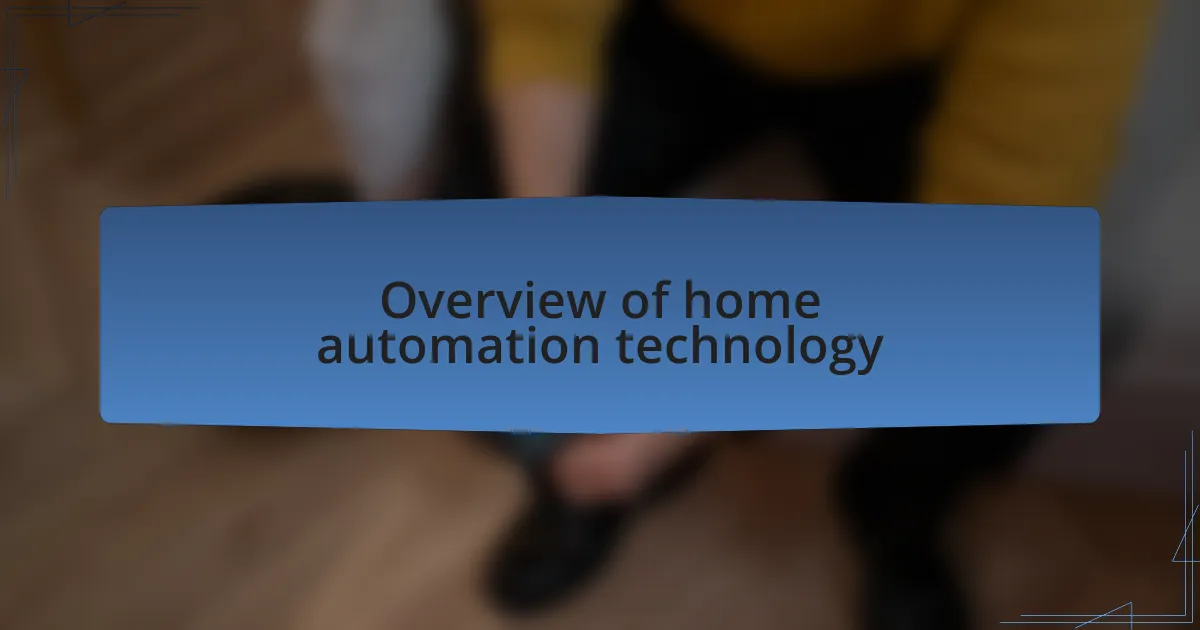
Overview of home automation technology
Home automation technology is revolutionizing the way we interact with our living spaces. Imagine walking into your home and having the lights automatically adjust, the thermostat set to your preferred temperature, and your favorite music gently playing in the background. This level of convenience not only enhances our daily routines but also offers peace of mind, knowing that our homes are tailored to our needs.
The beauty of home automation lies in its ability to integrate various devices and systems seamlessly. For instance, I’ve often found myself grappling with the timing of my home security systems and environmental controls. When I finally embraced smart technology, I could program my home alarms to coordinate with security cameras and motion detectors, creating a comprehensive safety net. It makes me wonder—how did I ever manage before this incredible interconnectedness?
Moreover, the emotional impact of having a smart home cannot be overstated. There’s a comforting feeling that washes over me when I know I can monitor my home remotely at any time. Have you ever left home and halfway down the street questioned whether you locked the door? With home automation, I can simply check my app and alleviate that nagging worry. It’s this synergy between technology and daily life that truly elevates our routines and enriches our experiences at home.
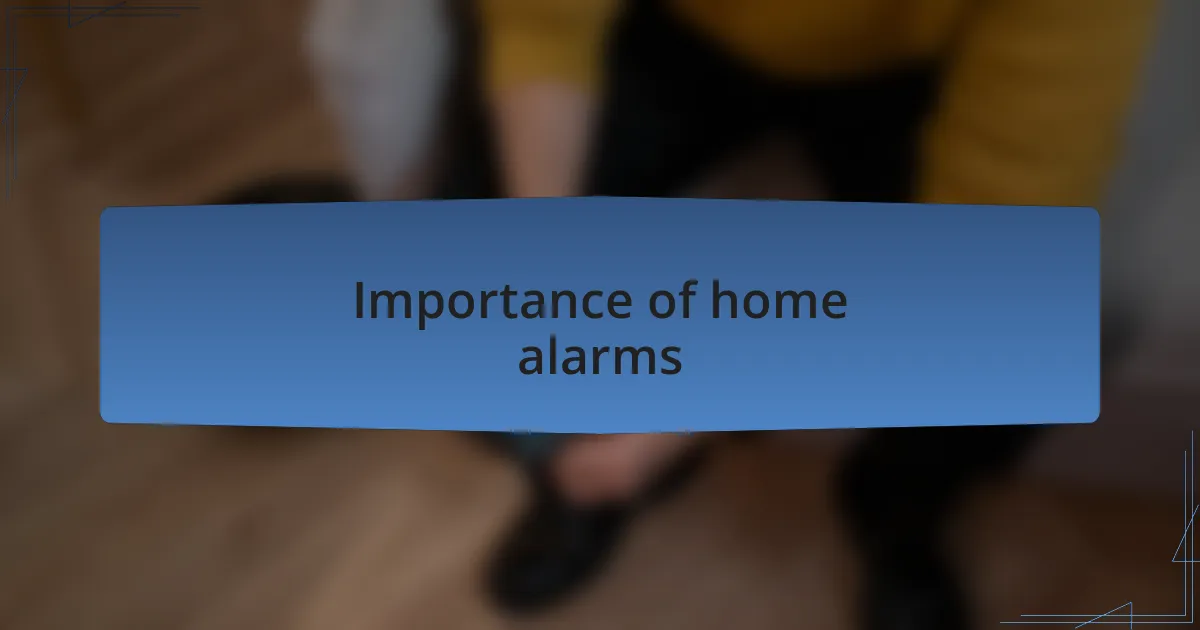
Importance of home alarms
Home alarms play a crucial role in safeguarding our living spaces, acting as the first line of defense against potential threats. I remember the sense of dread I felt after hearing about a neighbor’s break-in; it prompted me to take a serious look at my home security. Securing your home isn’t just about protecting possessions; it’s about ensuring a safe environment for family and peace of mind for yourself.
The significance of home alarms extends beyond mere detection of intruders. For instance, I experienced a moment of sheer relief when my alarm system alerted me to a potential leak while I was away on vacation. Having that level of protection, which extends to fire and carbon monoxide alarms as well, makes you realize how interconnected safety and technology have become in our everyday lives. Intriguingly, how often do we consider that our home alarms can do so much more than just serve as a deterrent?
Not only do home alarms provide immediate alerts, but they can also be integrated into a broader smart home system, enhancing overall security. I’ve found that linking my alarm system to my smartphone allows me to receive real-time updates, ensuring that I can respond quickly to any unusual activity. This integration has fundamentally changed how I perceive safety; it’s no longer reactive but rather proactive, shifting my approach to home security entirely.
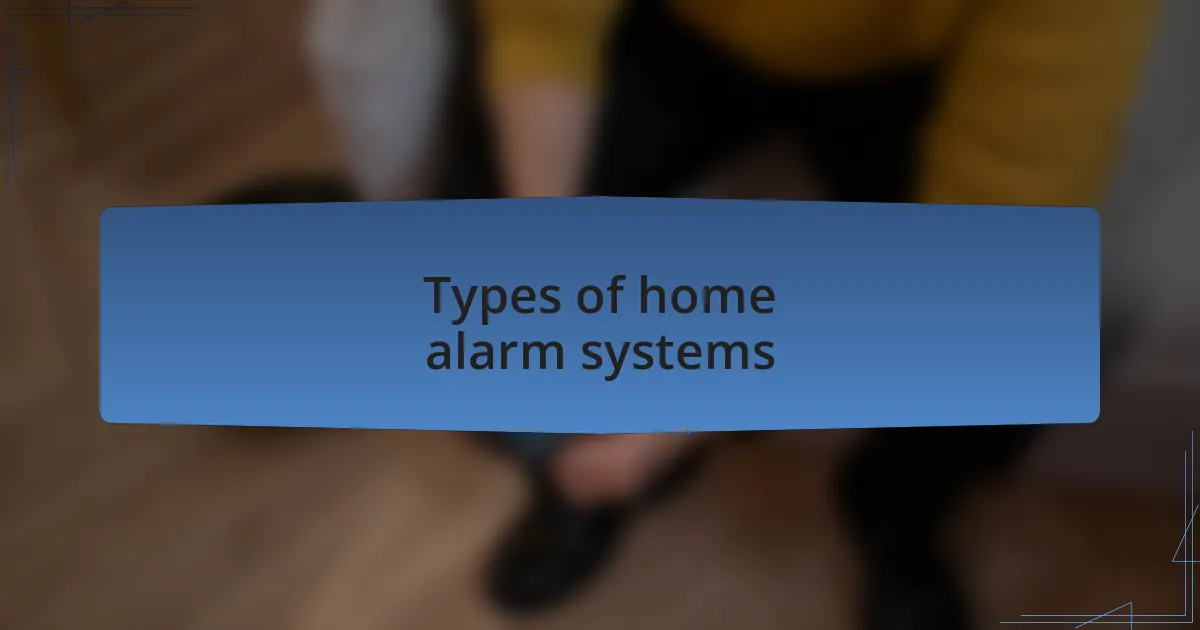
Types of home alarm systems
When exploring types of home alarm systems, it’s fascinating to see how varied the options are. For instance, I’ve used both wired and wireless systems, and while the wired options tend to be more reliable, wireless systems offer flexibility and easier installation. I remember struggling with the decision; the convenience of wireless ultimately won me over, especially when I realized I could easily expand my system without the hassle of running cables through walls.
Another category that deserves attention is the monitored versus unmonitored alarm systems. Personally, I opted for a monitored system because I appreciated the assurance that a professional team would respond to alerts when I wasn’t home. Many people might wonder if it’s worth the monthly fee—my experience tells me that the peace of mind during a vacation or a long day at work is priceless, especially knowing someone is always watching over my space.
Then there are smart alarm systems, which integrate seamlessly with other home automation technology. I remember the first time I controlled my alarm system through an app; it felt like stepping into the future. The ability to set or disarm my alarm from anywhere gave me a sense of control that I never knew I needed. It’s not just about convenience, either. These systems often come with advanced features like facial recognition and smartphone alerts, fueling my belief that the future of home security is personal and adaptive.
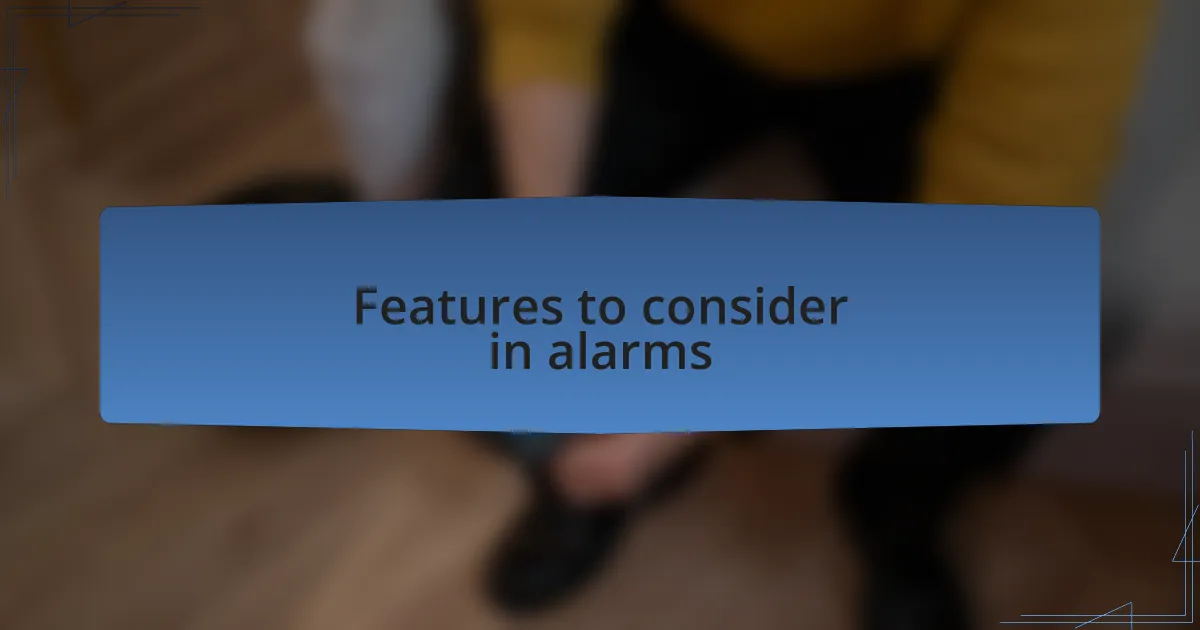
Features to consider in alarms
When considering features for home alarms, the detection technology is crucial. I recall a time when I faced false alarms due to inadequate motion sensors; those moments of chaos made me realize how vital it is to choose a system with precise detection capabilities. A combination of door/window sensors and motion detectors often provides a balanced layer of security, ensuring that alarms trigger accurately without unnecessary disruptions.
Another key feature I find essential is the accessibility of emergency services. I once experienced a minor incident where a quick response made all the difference. Knowing that my alarm system could contact authorities directly, without my intervention, provided a level of comfort that I never took for granted again. This leads me to believe that integrating features that connect your alarm to local law enforcement or fire services can truly enhance safety.
Lastly, don’t overlook the user interface and ease of use. I remember struggling with a complicated alarm system, and it felt more like a chore than a security measure. Choosing an alarm system that is intuitive and user-friendly makes it more likely that users, especially those less tech-savvy, will actually utilize its features effectively. After all, what good is advanced technology if it becomes a barrier rather than a protective measure?
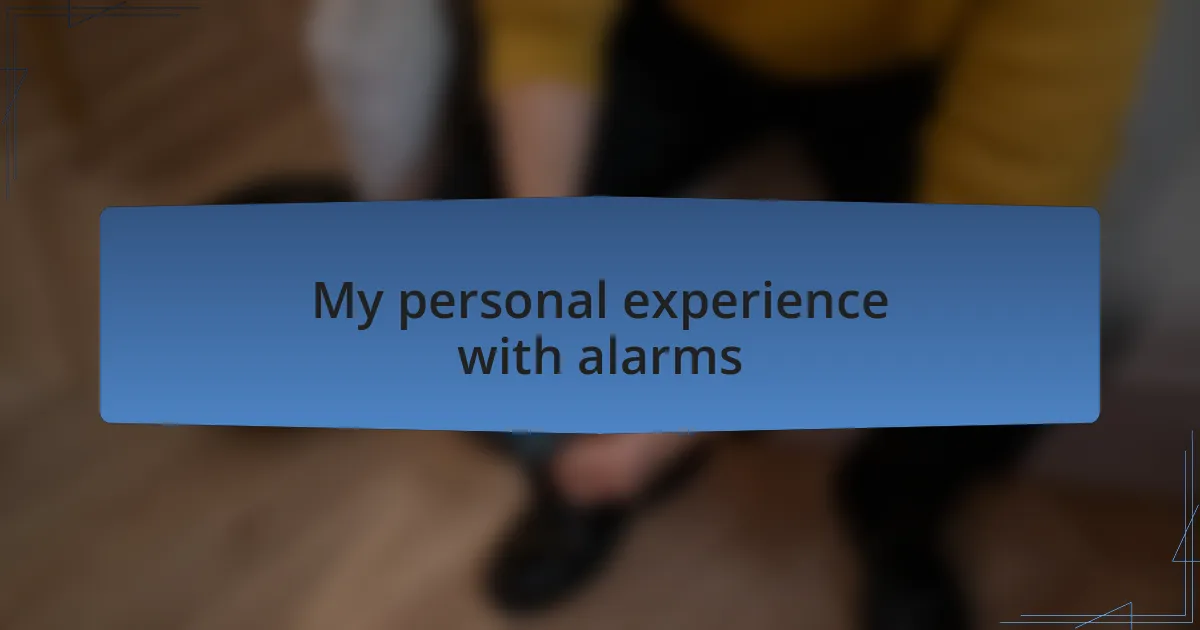
My personal experience with alarms
My journey with home alarms began a few years ago when I decided to upgrade my security system after a close call with a suspicious neighbor. I remember the anxiety that crept in at night, making me aware of every little sound. My first alarm system gave me a sense of safety, but it wasn’t until I switched to a model with real-time notifications that I truly felt at ease. Now, whenever my door opens or a window is ajar, I receive an alert right on my phone. Doesn’t that make a difference in peace of mind?
After dealing with unresponsive motion sensors, I learned the hard way that not all alarms are created equal. I experienced a particularly stressful evening when my alarm went off for no reason, and it took what felt like an eternity to figure it out. That incident taught me to prioritize systems that perform well in varied conditions. I discovered that investing in a model with advanced analytics really paid off – it accurately distinguishes between a person and a passing cat, leading to fewer frustrating false alarms.
The emotional relief I felt when my new system effectively notified authorities during a potential break-in was unforgettable. I still vividly recall that night. I was tucked in bed when my phone buzzed with an emergency alert. Knowing help was already on the way allowed me to breathe easier, even in a distressing situation. Reflecting on this, I now realize the importance of choosing a system that not only reacts quickly but also assures the homeowner that help is always just a button away. Isn’t that what we all want when it comes to our personal safety?
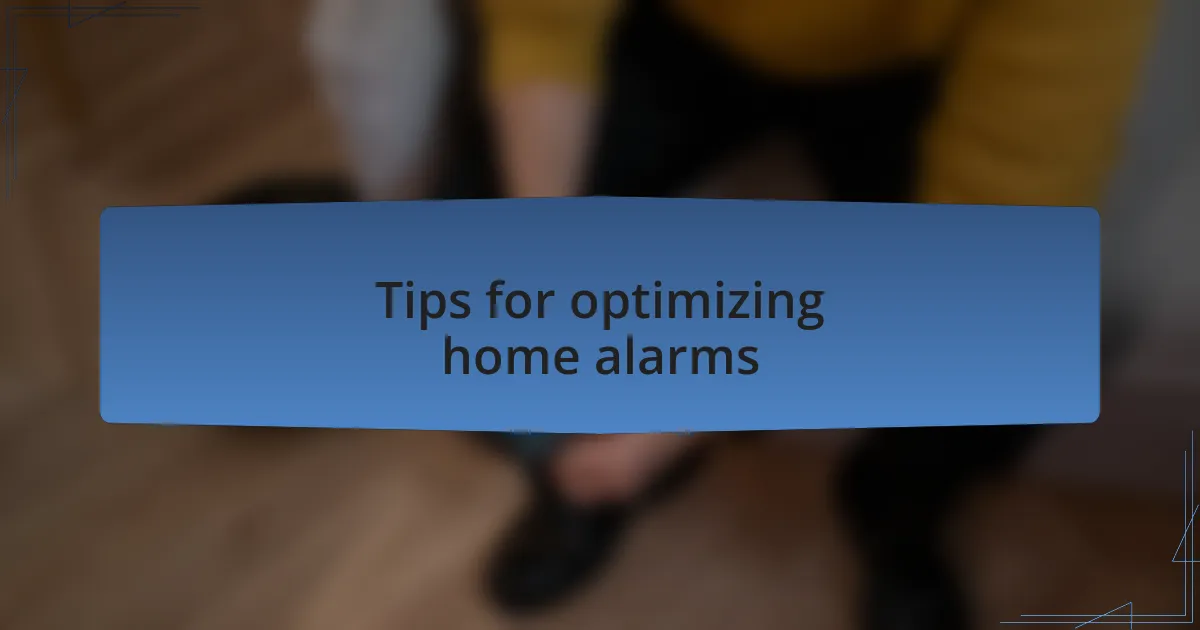
Tips for optimizing home alarms
When optimizing your home alarm system, it’s crucial to ensure that all components are working in harmony. I learned the importance of positioning my sensors correctly; a simple shift in location made a significant difference in their response time. Have you ever thought about how small adjustments can lead to greater security?
Regularly updating your system’s software is another tip that I wish I had prioritized sooner. I remember a day when I missed a crucial update, and my system’s performance dipped significantly. Staying updated not only enhances features but can also fix potential vulnerabilities — it’s like giving your system a little upgrade boost to keep your peace of mind intact.
Lastly, I found that setting custom notifications for different alerts can really personalize your experience. For example, I tailored mine to notify me of movement only in specific areas at night. This way, I avoid constant alerts about mundane happenings, allowing me to focus on what truly matters. Don’t you want your security system to work for you, tailoring its responses to match your lifestyle and needs?